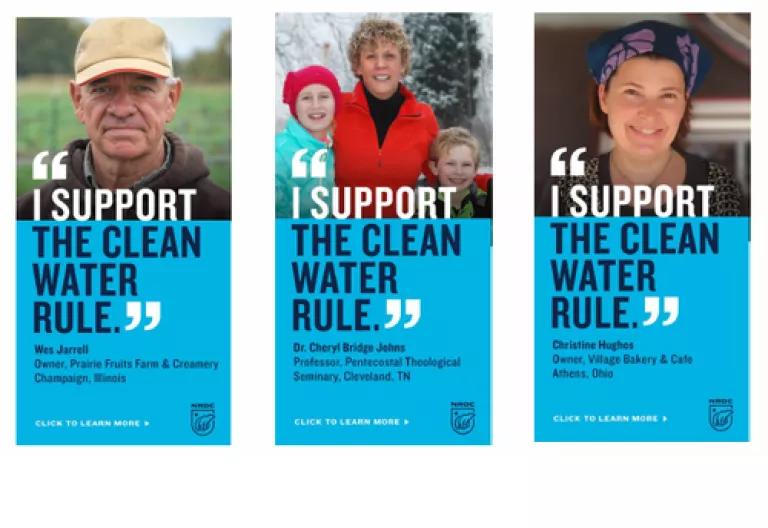Big Polluter Agenda comes for water: a rundown of the Clean Water Rule hearing in Congress

The 114th Congress, newly under complete Republican control, has wasted little time in launching a series of attacks on the nation's health and environmental safety net. In pursuing the Big Polluter Agenda, Congress already voted to approve the Keystone XL tar sands pipeline; the House passed a pair of bills (H.R. 185 and H.R. 50) that seek to hamstring administrative agencies from adopting health, safety, and other rules; and Senator Vitter and nine of his colleagues introduced a bill aimed at greasing the skids for the destructive Pebble Mine. In addition to being polluter-friendly, the most notable thing about this agenda is that it lacks any real solutions to the nation's problems, and instead is just a litany of actions that the Obama administration is trying to take and that the Republican leadership in Congress is trying to derail.
This week saw the Republican leadership try to check another item off their dirty to-do list, when they staged a joint House-Senate hearing about the Clean Water Rule that the Environmental Protection Agency and Army Corps of Engineers have developed. The hearing was meant to set the stage for opponents of that rule to move legislation to kill the rule. (Such legislation has already been introduced on the House side and was promised soon on the Senate side).
But then a funny thing happened on the way to the execution. Clean water champions came out in force, and made it clear that the Clean Water Rule - which would restore protections against pollution that once existed for a variety of small, seasonal, and rain-dependent water bodies, but that have been eroded by policies implemented in the past decade or so - would not be killed without a fight.
California Senator Barbara Boxer, a long-time clean water champion, really set the stage for the hearing in her opening statement. She remarked, "I have never had a constituent of either party come up to me and say ... 'the water is too clean,'" and she highlighted the need to protect waters currently at risk in order to safeguard our families, including one in three Americans who get drinking water from systems that rely on headwater, intermittent, and ephemeral streams for supply. Later, Senator Boxer pointed out the broad public support for the rule, putting in the record letters from more than 1,000 groups covering more than 40 states. These supporters reflect a broad diversity of environmentalists, hunters and anglers, people of faith, public health advocates, state and municipal officials, and a host of businesses that rely on clean water. The agencies have received more than a million comments on this proposal, of which we know at least 820,000 support the action.
Once the hearing turned to questions for the administration witnesses, stalwart supporters of clean water took control. Maryland Senator Ben Cardin, who has been instrumental in efforts to restore the Chesapeake Bay, pointed out that the health of iconic water bodies like the Chesapeake (behind the handsome young men to the right) depends on protecting the headwaters that feed those waters. EPA Administrator Gina McCarthy agreed with Senator Cardin, remarking, "frankly, this is all about the science," and identifying a handful of the myriad benefits that small and seasonal waters provide.
Numerous other members of Congress stood out as clean water champs during the hearing. Some of the moments that got me most excited (fortunately, I watched from the office, where I live-tweeted the whole affair, so I didn't get in trouble for being too loud) included:
- Representative Eddie Bernice Johnson of Texas noted the support for the rule from elected officials (like the city of Austin) and citizen groups in her home state and pointing out that the science supporting the rule "unequivocally" showed how important streams and wetlands are for water quality downstream in larger lakes and rivers.
- California Representative Grace Napolitano reminded the hearing participants that "our nation has never recognized a right to pollute," and that restoring clear protections to our waterways would help address these concerns. By contrast, she noted that opponents of the rule want to "preserve the regulatory shadows" that enable polluters to discharge without proper accountability under the law. Representative Napolitano also praised the administration for its openness to adapting the rule in response to public input.
- Representative Elijah Cummings of Maryland focused on the benefits that the rule would deliver; Administrator McCarthy noted that clear rules of the road help everyone.
- Maryland Representative Donna Edwards highlighted the enormous in-state support that exists for the Clean Water Rule, including water-reliant businesses like Union Craft Brewing Co. and Heavy Seas Brewing Co. Other Maryland support for the rule includes the Maryland Department of the Environment, and from numerous municipalities and elected officials.
- Both Representative Peter DeFazio of Oregon and Nevada Representative Dina Titus expressed strong support for the agencies' efforts to restore clarity to the law, and secured Administrator McCarthy's enthusiastic commitment to both work with organizations that raised constructive criticisms about the rule and to meaningfully address substantive input in developing a final rule.
Because I have spent more time than I care to recount over the last several months refuting outlandish things said about this proposal, one of my favorite things about this hearing was that several members called foul on misleading claims that have been made about the Clean Water Rule by industry groups and their friends in Congress. Senator Whitehouse summed it up very well:
[W]e seem to have two hearings going on here. One on a mythical rule that would regulate any place where water collects or most any water or any wet place, and ... doesn't consult with states and local officials; and then this actual rule, which is in the middle of a very robust, Administrative Procedure Act process with millions of comments and a very active role taken by the states.
Likewise, Representative Edwards decried the "gross exaggerations" that have been launched about the rule, and Representative Jared Huffman of California observed, "if there's any story from today's hearing it has to be how weak and unfounded and just plain wrong some of the claims about this rulemaking are."
Meanwhile, outside the hearing room, scores of members of Congress and clean water advocates took to social media to demand strong clean water protections. Twitter was abuzz with posts tagged #protectcleanwater, as well as pro-clean water statements from Senators Cory Booker (NJ), Patrick Leahy (VT), Edward Markey (MA), Robert Menendez (NJ), Jeff Merkley (OR), Christopher Murphy (CT), and Elizabeth Warren (MA), and from Representatives Andre Carson (IN), Matt Cartwright (PA), Keith Ellison (MN), Elizabeth Esty (CT), and Jerrold Nadler (NY). And the web and numerous publications around town were blanketed in ads featuring real people who really care about clean water.

Of course, the hearing was not entirely overrun with supporters of the Clean Water Rule. Indeed, several opponents turned up. (Like I said, I think they were expecting a fun day of beating up on another of the administration's important initiatives.) But with each successive member, a pretty clear pattern emerged: (1) they avoided talking about the science, which overwhelmingly supports a strong rule; (2) they raised scattershot objections that the proposal should be scuttled because it was unclear, only to have the administration witnesses calmly explain how they were taking account of constructive input and share some of the approaches that were under consideration the final rule; and (3) they claimed that they "support clean water" despite opposing a rule that would improve how a host of pollution control programs work under the nation's primary safeguard for clean water.
All in all, the day was a clear win for clean water and for protecting the waters that we depend on for drinking, fishing, and swimming, and that provide us untold flood control and pollution filtration benefits. That doesn't mean we've stopped the Big Polluter Agenda with respect to water - indeed, we still very much expect that the attacks will come - but opponents are on notice that they fight clean water at their peril.
PS: This post obviously focuses on how members of Congress engaged on this important hearing. If you've read this far and are interested in other details of the hearing, you can watch the entire four-plus-hour session online.
I would particularly commend to your attention the second panel of the day. During that session, Clear Creek County, CO, commissioner Tim Mauck touted the economic benefits of protecting vulnerable water bodies: "The proposed clean water rule will protect the headwaters, tributaries, and wetlands that are essential for providing the high quality water that supports the hunting, fishing, rafting, and outdoor recreation that are an economic backbone for my community. Clean water from streams and wetlands also provide drinking water for thousands of our residents." Likewise, Lem Srolovic of the New York Attorney General's office echoed the strong support for the rule from several state attorneys general, and also emphasized his own experience growing up in Wildwood, Georgia, and seeing personally the effects of pollution on the creeks and streams around him. For their part, the opposition witnesses did not add much to the wild claims of the Republican committee members. In particular, Oklahoma Attorney General E. Scott Pruitt, who has teamed with industrial opponents in attacking a number of environmental initiatives, reversed his state's view of the importance of federal protections for critical water bodies; Oklahoma had previously joined with more than 30 other states and the Bush administration in telling the Supreme Court that tributary streams and nearby wetlands need Clean Water Act protection.

